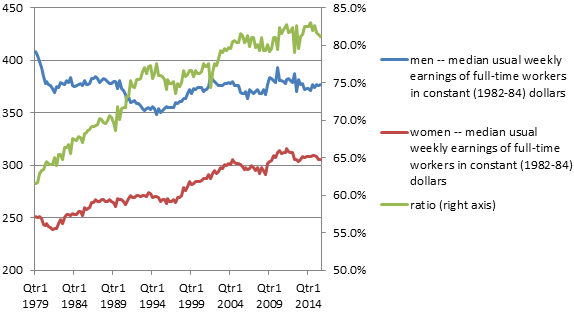
Syda Productions/Shutterstock.com
Why Does Progress on Women's Wages Seem to Be Stalling?
So far, 2015 has seen a widening of the gender pay gap—the first in decades.
For decades, women have been—slowly—catching up with men, in terms of how much they earn. But this year, that trajectory seems to have stopped or even reversed. According to an analysis of Americans’ weekly median earnings by TheWall Street Journal, men’s earnings are growing quite a bit faster than women’s this year. In the first three quarters of 2015, the increase in men’s earnings was double that of women’s. Compared with 2014, where the gap was the narrowest on record, this has raised some eyebrows.
What is going on here? Heidi Shierholz, chief economist at the Labor Department, says it’s important to look at the longer-term trends rather than just a year. “Men’s wages have been stagnant or falling since the 1970s,” said Shierholz. “Women’s wages, on the other hand, made substantial improvements from the 1970s up until the early 2000s.”
The gains in women’s wages in that 30-year period can be attributed to greater educational attainment, increasing female employment, and more women staying in the workforce after having children—which together led to higher wages and occupational upgrading (which means women upgraded to higher paying jobs that require more skill). But in the early 2000s, this dynamic shifted and women’s wage growth slowed. Though Shierholz believes it’s still a generally upward trend, the pace of improvement over the last decade has been much slower than during previous periods.
Median Weekly Earnings for Men and Women in the U.S.

“Since the early 2000s women’s wages have been basically flat,” explains Shierholz. So while rising wages for women are still expected in the long term, evaluating shorter periods of wage data will sometimes see a flatline or even an erosion of progress—and 2015 looks to be turning out to be one of those periods.
Marianne Bertrand, an economist and professor at the University of Chicago, echoed Shierholz’s assessment. “What we do know is that there has been a general slowdown of the reduction of the gender gap in terms of labor-force participation since the mid-1990s (mostly due to a plateauing in women’s labor-force participation). That is the only fact I feel is well established,” Bertrand said in an email.
Women’s labor-participation rate hit a high of 60.4 percent in 2000, the number stayed in that range until 2009 but it’s been falling since. Last month’s job report put the rate at 56.5 percent. After making enormous progress over six decades, the U.S. has now fallen behind European countries in female employment rates.
For progress to stall now would be troubling; despite the gains of recent decades, there is still a long way to go. “There is a gender wage gap across the board, in every part of the wage distribution men make more than women, but the difference rises the farther up the distribution you go,” said Shierholz. A recent report from PayScale, which looked at a poll of 1.4 million full-time workers, came to a similar conclusion: Women are paid less than men in all industries, and the gaps widen higher up the hierarchy.
The solutions proposed for closing the wage gap include allowing for flexible work hours, raising the minimum wage, banning salary negotiations, andrequiring companies to publicly report their wage gaps. For Shierholz, some solutions include raising the minimum wage, since women tend to hold the jobs that would be affected, and making up the ground loss in labor-force participation by ramping up paid family-leave options (although there is evidence that at the extreme, this can backfire—one OECD report found that countries that offered the most liberal paid-leave policies had some of the widest gender wage gaps).
As these are longterm trends, it might be years until it’s possible to really see whether this year’s lack of progress in closing the gender-pay gap is a plateau in an upward trend or a dropping off. Researchers remain optimistic that things are looking up. “I would not put too much weight on one year of data,” said Bertrand.
(Image via Syda Productions/Shutterstock.com)
NEXT STORY: Does Pay for Success Work? Define 'Success'






